Module 5Unit 2 It descibes the changes in Chinese society. 课件(共23张PPT,内嵌视频) 2023-2024学年外研版英语八年级上册
文档属性
| 名称 | Module 5Unit 2 It descibes the changes in Chinese society. 课件(共23张PPT,内嵌视频) 2023-2024学年外研版英语八年级上册 |
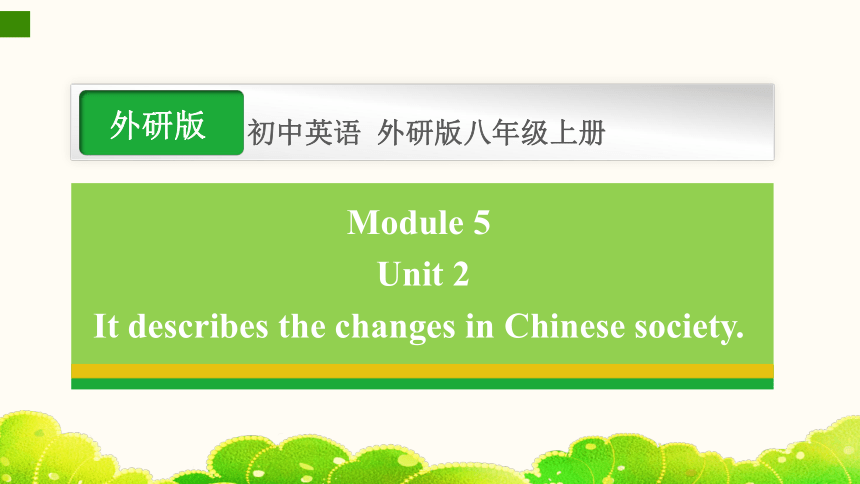
|
|
| 格式 | pptx | ||
| 文件大小 | 30.5MB | ||
| 资源类型 | 教案 | ||
| 版本资源 | 外研版 | ||
| 科目 | 英语 | ||
| 更新时间 | 2024-02-01 00:27:59 | ||
图片预览

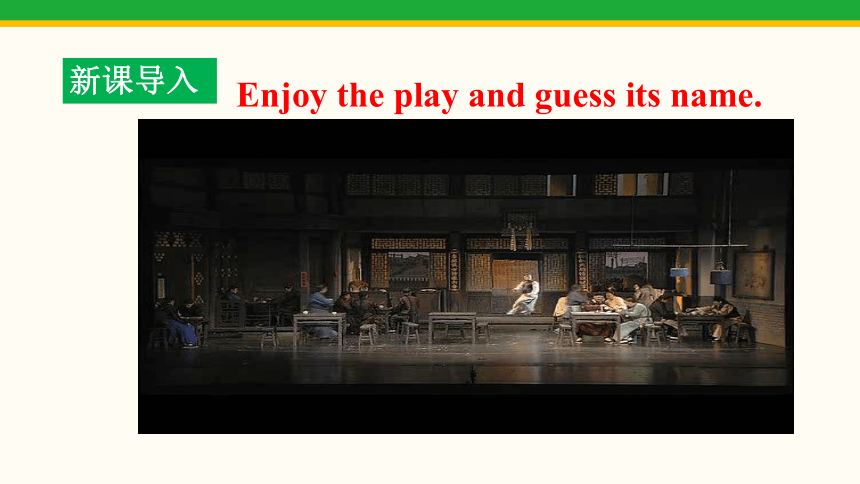
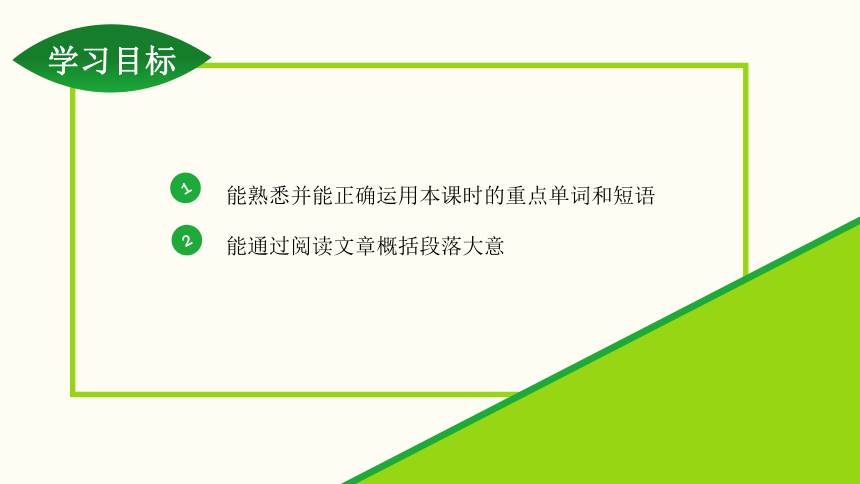
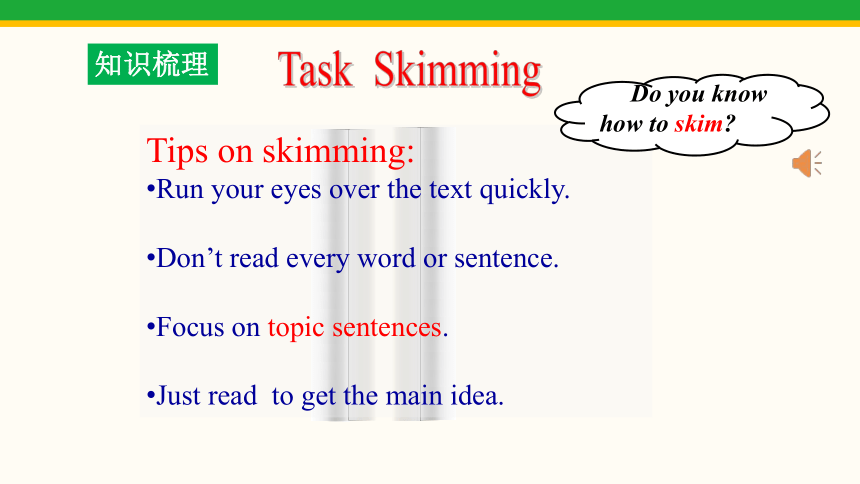
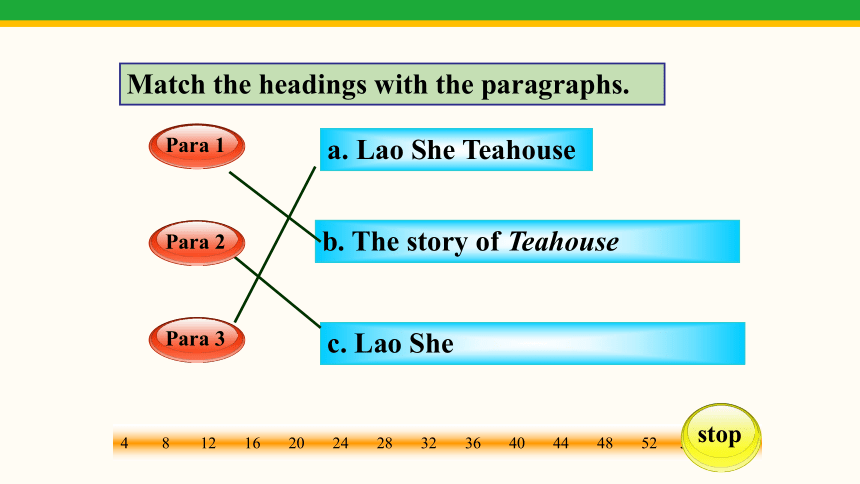

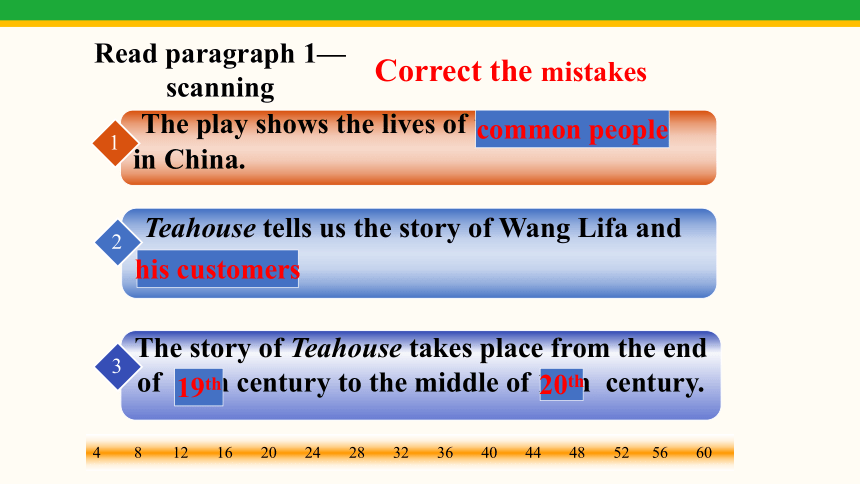
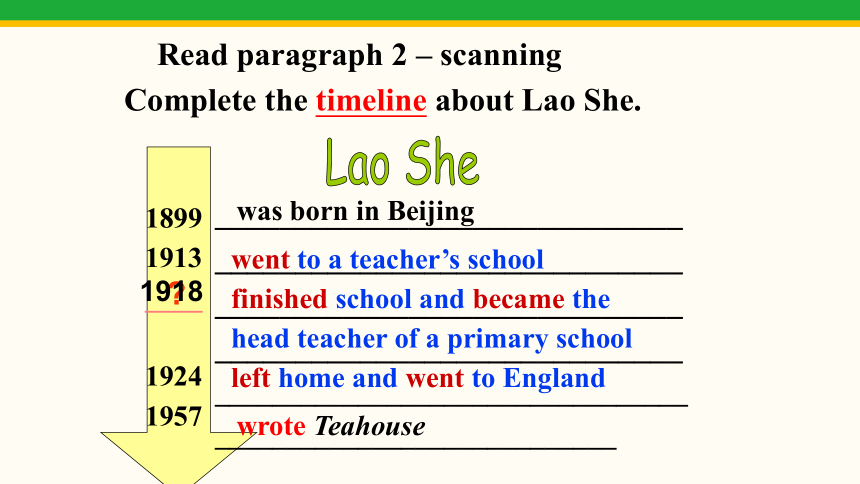

文档简介
(共23张PPT)
外研版
初中英语 外研版八年级上册
Module 5
Unit 2
It describes the changes in Chinese society.
新课导入
Enjoy the play and guess its name.
1
2
能熟悉并能正确运用本课时的重点单词和短语
能通过阅读文章概括段落大意
知识梳理
Tips on skimming:
Run your eyes over the text quickly.
Don’t read every word or sentence.
Focus on topic sentences.
Just read to get the main idea.
Task Skimming
Do you know
how to skim
Match the headings with the paragraphs.
a. Lao She Teahouse
b. The story of Teahouse
c. Lao She
Timing
4
8
12
16
20
24
28
32
36
40
44
48
52
56
60
Para 1
Para 2
Para 3
stop
Move your eyes quickly to find the certain information you need.
Task
2 Scanning
Tips on scanning
Do you know
how to scan
Correct the mistakes
2
The story of Teahouse takes place from the end
of 18th century to the middle of 19th century.
3
The play shows the lives of upper class
in China.
1
Teahouse tells us the story of Wang Lifa and Lao She.
common people
his customers
19th
20th
4
8
12
16
20
24
28
32
36
40
44
48
52
56
60
Read paragraph 1—scanning
1899
1913
____
1924
1957
Complete the timeline about Lao She.
Lao She
went to a teacher’s school
finished school and became the
head teacher of a primary school
left home and went to England
was born in Beijing
____________________________________________________________________________________________________________________
_________________________________
____________________________
1918
Read paragraph 2 – scanning
wrote Teahouse
We can drink _____.
We can eat_______________________.
We can also enjoy____________, ________________
and ____________.
If we go to Lao She Teahouse, what can we do
tea
delicious Beijing food
Beijing Opera
traditional music
magic shows
Read paragraph3—scanning
……
Summarize the structure of the text:
Tip3
3 Mind-mapping 思维图
Change the information into a mind map.
It describes the changes in Chinese society .
P 1
P 2
P 3
When
Where
in 1918
What
in 1899
in 1913
in 1924
What
Why
……
Summarize the structure of the text:
Task
3 Mind-mapping 思维图
Change the information into a mind map.
Who
⑤
⑥
④
③
②
①
Complete the passage with the words in the box.
century common if magic society writers
Lao She’s play, Teahouse, has three acts. It describes the life of Wang Lifa and the changes to the lives of
(1) _______ people in Chinese (2) ______ in the first half of the twentieth (3) _______.
Lao She went to a teacher’s school in Beijing, taught in London and later returned to China. He is one of China’s greatest (4)_______.
Come to Lao She Teahouse in Beijing (5)___ you like the Beijing Opera, traditional music or (6)_____ shows.
common
society
century
writers
if
magic
5 Complete the table.
Teahouse Your favourite play or film
Where does the story take place
When does the story take place
What is the story’s main idea
Why is it good
It shows the lives of common people in China.
In Beijing.
From the end of 19th century
to the middle of the 20th
century.
It tells the changes in Chinese society over 50 years.
Writing
6 Write sentences about Teahouse with the information in Activity 5. Use the passage in Activity 2 to help you.
The story of Teahouse takes place in Beijing.
The story starts at the end of the 19th century and finishes over 50 years later.
The story tells the changes in Chinese society over 50 years.
It is a good play because it shows the lives of common people in China.
Write a passage about your favourite play or film. Use Activity 5 and 6 to help you.
1 return
作动词,意为“返回,回来”,相当于come back。
eg:He returned home from school.
他放学回家。
作动词,意为“归还,回报”。
常见短语:return sb.sth.=return sth.to sb.
把某物归还给某人。
eg:He returned me my pen.
=He returned my pen to me.
他把钢笔归还给了我。
重点词汇探究
作名词,意为“归还;回报;报答”,
常见短语:in return 作为报答,作为回报。
eg:I sent him a book;in return,I got a coat.
我送给了他一本书;作为回报,我得到了一件外套。
2 name v. 给……命名,给……取名
被动形式:be named...“被称为……”。
同义词组:be called...
eg:He was named/called a national hero.他被誉为民族英雄。
3 if conj.如果;若
if 引导状语从句,表示条件或假设。若主句使用一般将来时,if引导的条件状语从句用一般现在时(主将从现)。
eg:If you come here,you will eat a big dinner.
如果你来这儿,你将吃到一顿大餐。
if 引导宾语从句时,常意为“是否”,此时if引导的宾语从句时态应由动作发生的时间决定。
eg:He asked if they went to the zoo.
他问他们是否去了动物园。
拓展
4 take place 发生
take place与happen
考向【辨析】
eg:The sports meeting will take place next Monday. 运动会将在下周一举行。
take place 多指根据计划或安排而发生。
happen 多指偶然发生。
活动小结
通过以上的活动,我们可以知道:
return return sb.sth.=return sth.to sb.
in return 作为报答,作为回报
name v. 给……命名,给……取名 be named...“被称为…”
if conj.如果;若 if引导的条件状语从句用一般现在时(主将从现)。
take place 发生
重点词汇:
return
name
in return
if
take place
主要句型:
Teahouse is one of Lao She’s most famous plays.
Lao She Teahouse gives a warm welcome to everyone from all over the world.
The story of Teahouse takes places in Beijing.
Module 5 Unit 2
外研版
初中英语 外研版八年级上册
Module 5
Unit 2
It describes the changes in Chinese society.
新课导入
Enjoy the play and guess its name.
1
2
能熟悉并能正确运用本课时的重点单词和短语
能通过阅读文章概括段落大意
知识梳理
Tips on skimming:
Run your eyes over the text quickly.
Don’t read every word or sentence.
Focus on topic sentences.
Just read to get the main idea.
Task Skimming
Do you know
how to skim
Match the headings with the paragraphs.
a. Lao She Teahouse
b. The story of Teahouse
c. Lao She
Timing
4
8
12
16
20
24
28
32
36
40
44
48
52
56
60
Para 1
Para 2
Para 3
stop
Move your eyes quickly to find the certain information you need.
Task
2 Scanning
Tips on scanning
Do you know
how to scan
Correct the mistakes
2
The story of Teahouse takes place from the end
of 18th century to the middle of 19th century.
3
The play shows the lives of upper class
in China.
1
Teahouse tells us the story of Wang Lifa and Lao She.
common people
his customers
19th
20th
4
8
12
16
20
24
28
32
36
40
44
48
52
56
60
Read paragraph 1—scanning
1899
1913
____
1924
1957
Complete the timeline about Lao She.
Lao She
went to a teacher’s school
finished school and became the
head teacher of a primary school
left home and went to England
was born in Beijing
____________________________________________________________________________________________________________________
_________________________________
____________________________
1918
Read paragraph 2 – scanning
wrote Teahouse
We can drink _____.
We can eat_______________________.
We can also enjoy____________, ________________
and ____________.
If we go to Lao She Teahouse, what can we do
tea
delicious Beijing food
Beijing Opera
traditional music
magic shows
Read paragraph3—scanning
……
Summarize the structure of the text:
Tip3
3 Mind-mapping 思维图
Change the information into a mind map.
It describes the changes in Chinese society .
P 1
P 2
P 3
When
Where
in 1918
What
in 1899
in 1913
in 1924
What
Why
……
Summarize the structure of the text:
Task
3 Mind-mapping 思维图
Change the information into a mind map.
Who
⑤
⑥
④
③
②
①
Complete the passage with the words in the box.
century common if magic society writers
Lao She’s play, Teahouse, has three acts. It describes the life of Wang Lifa and the changes to the lives of
(1) _______ people in Chinese (2) ______ in the first half of the twentieth (3) _______.
Lao She went to a teacher’s school in Beijing, taught in London and later returned to China. He is one of China’s greatest (4)_______.
Come to Lao She Teahouse in Beijing (5)___ you like the Beijing Opera, traditional music or (6)_____ shows.
common
society
century
writers
if
magic
5 Complete the table.
Teahouse Your favourite play or film
Where does the story take place
When does the story take place
What is the story’s main idea
Why is it good
It shows the lives of common people in China.
In Beijing.
From the end of 19th century
to the middle of the 20th
century.
It tells the changes in Chinese society over 50 years.
Writing
6 Write sentences about Teahouse with the information in Activity 5. Use the passage in Activity 2 to help you.
The story of Teahouse takes place in Beijing.
The story starts at the end of the 19th century and finishes over 50 years later.
The story tells the changes in Chinese society over 50 years.
It is a good play because it shows the lives of common people in China.
Write a passage about your favourite play or film. Use Activity 5 and 6 to help you.
1 return
作动词,意为“返回,回来”,相当于come back。
eg:He returned home from school.
他放学回家。
作动词,意为“归还,回报”。
常见短语:return sb.sth.=return sth.to sb.
把某物归还给某人。
eg:He returned me my pen.
=He returned my pen to me.
他把钢笔归还给了我。
重点词汇探究
作名词,意为“归还;回报;报答”,
常见短语:in return 作为报答,作为回报。
eg:I sent him a book;in return,I got a coat.
我送给了他一本书;作为回报,我得到了一件外套。
2 name v. 给……命名,给……取名
被动形式:be named...“被称为……”。
同义词组:be called...
eg:He was named/called a national hero.他被誉为民族英雄。
3 if conj.如果;若
if 引导状语从句,表示条件或假设。若主句使用一般将来时,if引导的条件状语从句用一般现在时(主将从现)。
eg:If you come here,you will eat a big dinner.
如果你来这儿,你将吃到一顿大餐。
if 引导宾语从句时,常意为“是否”,此时if引导的宾语从句时态应由动作发生的时间决定。
eg:He asked if they went to the zoo.
他问他们是否去了动物园。
拓展
4 take place 发生
take place与happen
考向【辨析】
eg:The sports meeting will take place next Monday. 运动会将在下周一举行。
take place 多指根据计划或安排而发生。
happen 多指偶然发生。
活动小结
通过以上的活动,我们可以知道:
return return sb.sth.=return sth.to sb.
in return 作为报答,作为回报
name v. 给……命名,给……取名 be named...“被称为…”
if conj.如果;若 if引导的条件状语从句用一般现在时(主将从现)。
take place 发生
重点词汇:
return
name
in return
if
take place
主要句型:
Teahouse is one of Lao She’s most famous plays.
Lao She Teahouse gives a warm welcome to everyone from all over the world.
The story of Teahouse takes places in Beijing.
Module 5 Unit 2
同课章节目录
- Module 1 How to learn English
- Unit 1 Let's try to speak English as much as possi
- Unit 2 You should smile at her.
- Unit 3 Language in use .
- Module 2 My home town and my country
- Unit 1 It's taller than many other buildings.
- Unit 2 Cambridge is a beautiful city in the east o
- Unit 3 Language in use .
- Module 3 Sports.
- Unit 1 Nothing is more exciting than playing tenni
- Unit 2 This year we training more carefully.
- Unit 3 Language in use .
- Module 4 Planes, ships and trains .
- Unit 1 He lives the farthest from school.
- Unit 2 What is the best way to travel.
- Unit 3 Language in use .
- Module 5 Lao She Teahouse.
- Unit 1 I wanted to see the Beijing Opera.
- Unit 2 It descibes the changes in Chinese society.
- Unit 3 Language in use .
- Module 6 Animals in danger.
- Unit 1 It allows people to get closer to them .
- Unit 2 The WWF is working hard to save them all.
- Unit 3 Language in use .
- Revision module A
- Module 7 A famous story
- Unit 1 Alice was sitting with her sister by the ri
- Unit 2 She was thinking about her cat.
- Unit 3 Language in use .
- Module 8 Accidents
- Unit 1 While the car were changing to red, a car s
- Unit 2 I was trying to pick it up when it bite me
- Unit 3 Language in use .
- Module 9 Population
- Unit 1 The population of China is about 1.37 billi
- Unit 2 Arnwick was a city with 200,000 people.
- Unit 3 Language in use .
- Module 10 The weathe
- Unit 1 It might snow.
- Unit 2 The weather is fine all year round.
- Unit 3 Language in use .
- Module 11 Way of life
- Unit 1 In China ,we open a gift later.
- Unit 2 In England, you usually drink tea with milk
- Unit 3 Language in use .
- Module 12 Help
- Unit 1 What should we do before help arrives?
- Unit 2 Stay away from windows and heavy furniture.
- Unit 3 Language in use .
- Revision module B
